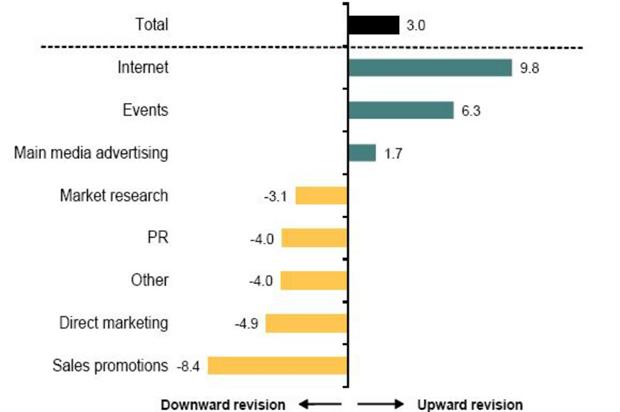
The findings revealed that , which represents a significant jump from .
Analysing the results
Stuart Knight, partner and managing director at Whynot believes social media has influenced event marketing spend, as its helped bring experiential to the forefront of marketers’ minds.
"The ongoing ubiquity of social media and its ferocious appetite for quality content means that experiential is increasingly moving to centre stage of the marketing mix.
"The interaction of technology and experiential also means that the ability to evaluate a return on investment has improved dramatically. With the collection and use of data also finding a clear identity real time customer engagement is increasingly valuable in creating lasting and evolving customer and consumer relationships," he adds.
Kim Myhre, senior vice president and managing director at FreemanXP EMEA isn’t overly surprised by the positive results, given that brands are coming to realise the importance of live events on a much larger scale.
"Recent reports on marketing trends all recognise the increasing importance of brand experiences in driving customers to action, creating sustainable loyalty and building earned advocacy," he explains.
"Live event experiences are no longer nice to have, they are now becoming the bedrock of brand marketing strategy."
The managing director of agency Avantgarde, Stuart Bradbury adds: "We would need to compare Q1 2016 with Q1 2015, but overall 2016 has started with confidence."
External factors
Bradbury believes that the maroeconomic issue of Brexit could have an impact on the industry in the future. "The biggest issue is the possibility of Brexit. The EU is the UK’s biggest trading operator. EU countries buy 44% of everything we sell abroad from financial services to insurance, chemicals, IT and telecoms and food.
"A single market makes it easier and cheaper to sell its products and services outside the UK. Leaving the EU would cause prices to rise and would obstruct future foreign investment and yet we would still have to deal with the EU but have no say. Leaving would be a massive mistake for our industry and others," he says.
Myhre recognises that the state of the economy can affect live experience spend, however he doesn’t feel it should underlie a brand’s marketing approach.
"If brands have learned anything from the last weak economy it is that continuing to market and engage customers is critical to riding out the storm. In many ways strong brand experiences and the customer relationships they nurture are key to economic survival," he explains.
Knight doesn’t see external factors such as the economy, broader macroeconomic climate or government spending cuts as impacting on the industry. "Obviously a week economic landscape across the board isn’t healthy or helpful for any business sector but I see events and experiential evolving and changing, not receding.
"Regardless of the economic climate and government tinkering brands continue to connect with their consumers and customers and they understand how important that is ,what we will see is the continued investment in experiential especially around its relationship with technology and data whether we are in the EU or not," he explains.
Where are we headed?
While internet spend was recorded as the top performing sector, with an upward revision of +9.8%, Myhre makes it clear that events offer something completely different to the virtual realm.
"Online experiences are not a replacement for the need for people to meet and engage in a live experience. Live experiences are 1000s of years old and will likely continue at pace, as the online world increasingly looks for live human experience and interaction."
He adds that when executed effectively, the two modes of marketing can complement one another, with digital able to extend the life of an event long after it has ended.
"But that’s not to say that digital has not changed the live experience. Increasingly we expect more 'on-live' experiences - where online and live work seamlessly together to amplify the brand experience beyond the event itself for the immediate and connected communities."
Bradbury sees technology as an enabler of live experiences - particularly from a measurement perspective, and recognises that the two are very much intertwined now.
"As experiential and digital channels are much more integrated and as new technology has developed we are able to track and measure the success of event marketing campaigns much more accurately and effectively.
"Therefore marketeers/clients are increasingly seeing the benefit of experiential marketing within a very crowed space. Experiential marketing is increasingly being used to create exclusive and appealing content which is then shared and amplified through social media channels. It is a hugely effective form of hitting target markets," he adds.
Knight has an overall positive outlook, and has noticed that the quality of events being produced improves year-on-year. "Consumer experience must reflect the quality and integrity of the brand so I see improvements and standards continuing to evolve," he explains.
He also predicts technology will become increasingly important at events. "We are already seeing experiments with cashless solutions and wearable technology, and things like geo-fencing will mean more meaningful interactions with consumers – interactions that will continue long after the event."
Read up on the , as well as our .
Comment below to let us know what you think.
For more in-depth and print-only features, showcases and interviews with world-leading brands, don't miss the next issue of Event magazine by .

